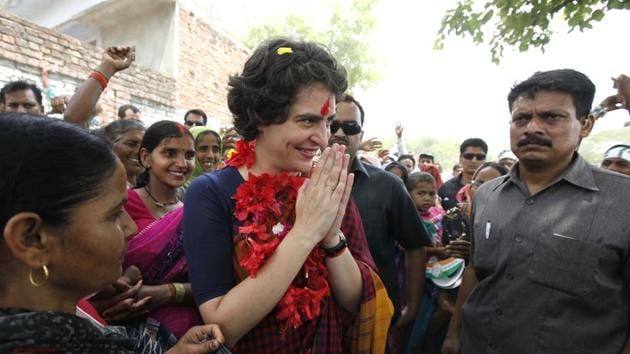Will the ‘behen’ be the Congress’s counter to ‘Behenji’ in UP? | Barkha Dutt column
The Priyanka Gandhi-Jyotiraditya Scindia project is about the long-term revival of the party in a state that has voted for three Congress prime ministers of the Nehru-Gandhi family. A respectable performance in UP, which can constrict the rise of non-BJP parties, will give the Congress the pivot position in any negotiation by opposition parties over who should be the next PM.
Priyanka Gandhi’s dramatic, front-foot entry into politics has galvanised Congress cadres and thrown the BJP into sheer confusion. There is a certain audacity and boldness to her debut as general secretary of Uttar Pradesh, East, the political stomping ground of chief minister Yogi Adityanath and Prime Minister Narendra Modi.

But now that Rahul Gandhi has decided to appoint his behen (sister) to this critical post, what will be the Congress’s strategy to manage Behenji (as Mayawati is often called)? Is there a danger of the Priyanka announcement creating friction between the Congress and the Mayawati-Akhilesh gathbandhan (alliance)? Can the Gandhis bhai-behen jodi (brother-sister duo) work in tandem with the bua-bhatija (aunt-nephew) duo, or will they be at odds with each other?
While Rahul Gandhi was careful to underline that he had the deepest respect for both Mayawati and Akhilesh Yadav and insisted that the Congress was ready to cooperate wherever possible, sources confirm that the siblings have a better relationship with the Samajwadi Party (SP) chief than with the Bahujan Samaj Party (BSP) leader. In fact, the Congress believes that it is Mayawati who insisted on edging it out of the alliance in Uttar Pradesh, leaving only a token offer of two seats: Amethi and Raebareli. As one senior Congress leader told me: “If she shuts us out, we can’t roll over and play dead, can we?”
Even if ticket distribution and candidate selection is done in tactical communication with the SP-BSP, Priyanka Gandhi’s entry could well eat into the Muslim-Dalit vote of the gathbandhan and not just the Brahmin/upper caste base of the BJP. While pundits dub this as a three-cornered contest that will suit the BJP, there is another way of looking at it.
While the main aim of the Congress would naturally be to dislodge Narendra Modi — and it knows the route to Delhi is via Uttar Pradesh — what if the strategy is also to simultaneously contain the rise of Mayawati? This certainly appears to be the hand the Congress is playing. Mayawati has also been scathing about the Congress in public, arguing that the Congress is unable to transfer its votes to allies, while benefiting from them.
The Congress’ tacticians wargaming UP would hope for a result closer to its 2009 performance when the party won 21 seats in the state. In the absence of an organisational cadre on the ground and now down to just two Lok Sabha seats (its worst ever tally), this is still a tall order at the moment.
But if the buzz around Priyanka Gandhi succeeds in transcending constituency-wise caste calculations and she picks up some votes across categories, among upper caste Hindus, women, Muslims, Dalits, non-Yadav OBCs, the party will aspire to 10-15 seats. Seats that fall within the eastern Uttar Pradesh area allotted by the party to Priyanka Gandhi include the family pocket boroughs of Amethi and Raebareli as well as constituencies such as Phulpur that have in the past voted for Jawaharlal Nehru and his sister, Vijaya Lakshmi Pandit. Though the Congress has not won a seat here since 1984, and the SP candidate won in the recent bypoll, the party believes that Priyanka Gandhi’s presence in what was once Nehru territory could trigger nostalgia and sentiment. Her managing the campaign in at least 40 Lok Sabha seats also frees her brother, the Congress president, to travel elsewhere and focus on other states. The party is also calculating that once she is at the helm, there will be a spillover impact on the politics of Bihar, which borders eastern UP. What is clear is that the organisational role for her is not about local politics; it is the launch of her as a mass leader. And it is about the national ambitions of the Congress party.
Any result that dislodges Modi but also limits the BSP chief to fewer than 20 seats will effectively nullify Mayawati’s chances of pitching for the prime minister’s post in a hung Parliament. In the estimation of the Congress, this will also stop the complete handing over of India’s most populous and politically important state to regional forces.
The Priyanka Gandhi-Jyotiraditya Scindia project (Scindia has been appointed in charge of west UP) is about the long term revival of the party in a state that has voted for three Congress prime ministers of the Nehru-Gandhi family. A respectable performance in UP, which can constrict the rise of non-BJP parties, will give the Congress the dominant position in any negotiation by opposition parties over who should be the next PM.
The Congress gamble is bold but also laden with risks. It needs almost perfectly controlled calibration. But in case it succeeds even partially, it isn’t only the BJP that will be forced to regroup and re-strategise its UP campaign.
Mayawati will not be mighty pleased either.
Barkha Dutt is an award-winning journalist and author
The views expressed are personal






